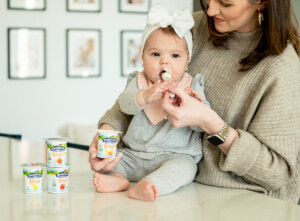The battle of opinions regarding whether or not you can spoil a baby has been raging for decades, especially among grandparents and those born during a time of little affection. Our children’s great-grandparents were most likely raised with the idea that love and affection and responding to a baby’s cries will spoil them and make them even fussier. While that idea might seem ludicrous to us, there’s a reason such an approach was widely believed.
Parenting “Advice” of the 1930s
“Never hug and kiss them or let them sit on your lap. Shake hands with them in the morning. Pat them on the head if they have done an extraordinarily good job of a difficult task. If you must kiss them once on the forehead when they say good night.”
This was the general advice in the 1930s from child behaviorists such as John Watson and his Psychological Care of the Infant and Child manual.1,2,3,4 Children were often treated as young adults. Warnings were given that if you loved and cared for your child too much, you could spoil them. The idea was that society would not be so kind to adults when they entered the real world. Parents should mimic the harsh realities of the real world instead of setting unrealistic expectations of love and kindness.
However, Watson later regretted his writings and admitted that he did not know enough to give proper advice. He and other so-called experts in child psychology instilled beliefs that negatively affected children through the decades. Even the United States government warned against “excessive” affection toward children. They only recommended kissing children on their foreheads and keeping hugs or other affectionate actions to a bare minimum.
An About-Face in the 1940s
As an opposite reaction, Dr. Benjamin Spock, in the late 1940s, published The Common Sense Book of Baby and Child Care.5 Dr. Spock was friendly and reassuring, the complete opposite of those who came before him. He stressed that mothers knew more than they thought and urged them to trust themselves. Instead of the strict feeding, toilet training, and sleep schedules recommended by Watson and others, Spock encouraged mothers to trust themselves, pay attention to their child’s cues, and respond accordingly. He encouraged affection and kindness to children.
Because of the experts’ contradicting views, it’s no wonder our grandparents’ generation and ours have conflicting parenting ideals. The “spoiled baby” advice of the ’30s still confuses parents today. In fact, in the late 90s, a landmark survey by Zero to Three revealed that 57% of young adults believed that a six-month-old could be spoiled. 44% of parents of young children and 60% of grandparents believe that picking up a three-month-old every time he cries would spoil them.6
Present-Day Science Says You Cannot Spoil a Baby
Crying is not a tool to manipulate parents. Babies cry when something is wrong and they require a response. Responding to your baby’s cries helps develop trust, teaching your baby that you will be there to help when they need something. If your baby cries and you ignore them, stress levels increase. This can have detrimental effects on your child’s learning abilities.
An April 2017 study published in Current Biology showed that supportive experiences such as breastfeeding and skin-to-skin care are associated with more robust brain responses.7 The researchers believe that touch is essential for shaping positive cognitive and social development. The study shows there is no limit to how much you can cuddle and hold your baby.7
Similarly, a 20-year study published in Pediatrics shows that the effects of skin-to-skin contact on premature infants were still proven to be beneficial 20 years later.8 The babies to experience skin-to-skin contact in the study had higher IQs and larger areas of their brain’s grey matter than those who did not. This resulted in higher average wage earnings and less chance of nonattendance, hyperactivity, and aggression during their school years.
Responding to Our Children is Good for their Health
The same sort of evidence has been seen for full-term babies as well. The Cochrane Database of Systematic Reviews published in 2012 says that babies who receive skin-to-skin contact during the first days after birth show better cardiorespiratory health, a greater chance of breastfeeding, and less colic.9
A quick response to your baby’s cries will result in less crying as your baby gets older, says researchers from John Hopkins University. Furthermore, research shows that appropriately responding to babies’ cries helps protect them against future mental health problems and adverse stress reactions.10
The Center for Early Education and Development states that responding to your child is not spoiling.11 Your instincts to respond to your baby’s cues are real and valid. Responding appropriately and consistently during the first year of your baby’s life helps your baby learn to cry less. This flies in the face of the adage that responding to your baby’s cries will make them fussier. Responding quickly to your baby’s cries will help them become more independent as they learn to trust their environment and not fear it.
Trust Yourself, Mama
Responding to your baby appropriately and consistently develops trust and security in the world for your child. They will believe that they are safe and can explore their world without the risk of not finding help when they need it.
So trust your instincts and listen to your heart and your baby. Sending a message to your baby that you love them and that you’ll be there for them will never spoil them. Trust yourself! You know more than you think you do.












